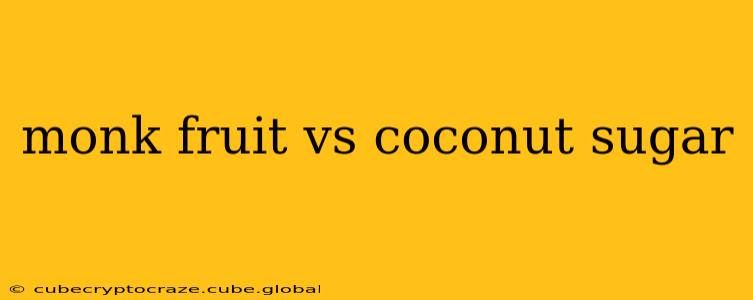Choosing the right sweetener can feel like navigating a minefield of conflicting information. With so many options vying for attention, understanding the differences between seemingly healthy alternatives is crucial. Today, we're diving deep into the sweet world of monk fruit and coconut sugar, comparing their nutritional profiles, glycemic impact, and overall suitability for various dietary needs.
What is Monk Fruit?
Monk fruit, also known as luo han guo, is a small, round fruit native to Southeast Asia. Unlike many other sweeteners, its sweetness comes from naturally occurring mogrosides, which are intensely sweet compounds. These mogrosides are responsible for monk fruit's exceptional sweetness, often estimated to be 150-200 times sweeter than sucrose (table sugar). This intense sweetness allows for a much smaller amount to be used, potentially reducing overall calorie intake. Monk fruit extract is typically used as a sweetener, as the fruit itself isn't easily consumed directly.
What is Coconut Sugar?
Coconut sugar is produced from the sap of coconut palm blossoms. It's a minimally processed sweetener that retains some of the nutrients found in coconut sap, including minerals like potassium and zinc. While often marketed as a healthier alternative, it's important to understand that it's still largely composed of sucrose. This means it shares similarities with table sugar in terms of its impact on blood sugar levels.
Monk Fruit vs. Coconut Sugar: Nutritional Comparison
| Feature | Monk Fruit Extract | Coconut Sugar |
|---|---|---|
| Calories | Very low (nearly zero) | Relatively high (approx. 15 calories per teaspoon) |
| Carbohydrates | Very low | High (approx. 4 grams per teaspoon) |
| Glycemic Index | Low (virtually no impact) | Moderate to High (depending on processing) |
| Sugar | Minimal | Primarily sucrose |
| Vitamins & Minerals | Minimal | Small amounts of Potassium, Zinc, etc. |
How Do They Affect Blood Sugar? (Glycemic Index)
Monk Fruit: Due to its negligible carbohydrate content and lack of sucrose, monk fruit has a very low glycemic index (GI). This means it doesn't significantly raise blood sugar levels. This makes it a suitable sweetener for individuals managing diabetes or following a low-carb diet.
Coconut Sugar: Coconut sugar has a moderate to high glycemic index, depending on how it's processed. While it may be slightly lower than table sugar, it still causes a noticeable rise in blood sugar levels, making it less suitable for those with diabetes or insulin resistance compared to monk fruit.
What is the Glycemic Index (GI)?
The Glycemic Index (GI) is a ranking system for carbohydrate-containing foods based on how quickly they raise blood sugar levels after eating. Foods with a low GI raise blood sugar slowly, while foods with a high GI cause a rapid increase.
Which is Better for Weight Loss?
Monk Fruit: The extremely low calorie content and lack of impact on blood sugar make monk fruit a very appealing option for those aiming to lose weight. It satisfies sweet cravings without significantly impacting caloric intake.
Coconut Sugar: Coconut sugar, with its higher calorie and carbohydrate content, is not as ideal for weight loss. While it contains some micronutrients, its impact on blood sugar can hinder weight management efforts.
Are There Any Side Effects?
Monk Fruit: Monk fruit is generally considered safe, but some individuals may experience mild digestive issues such as bloating or diarrhea if consuming large amounts. It’s important to note that monk fruit extract is used as a sweetener, not the whole fruit.
Coconut Sugar: While generally safe in moderation, excessive consumption of coconut sugar can contribute to weight gain and elevated blood sugar levels.
Monk Fruit vs. Coconut Sugar: Which One Should You Choose?
The "better" sweetener depends entirely on your individual needs and goals.
- For managing blood sugar and weight loss: Monk fruit is the clear winner due to its negligible impact on blood sugar and very low calorie count.
- For those seeking a minimally processed, natural sweetener with some added micronutrients (but willing to accept a higher glycemic impact): Coconut sugar might be a preferable choice, though moderation is key.
This detailed comparison helps clarify the distinctions between monk fruit and coconut sugar, empowering you to make informed decisions about your dietary choices. Remember to consult with a healthcare professional or registered dietitian before making significant dietary changes, especially if you have pre-existing health conditions.
